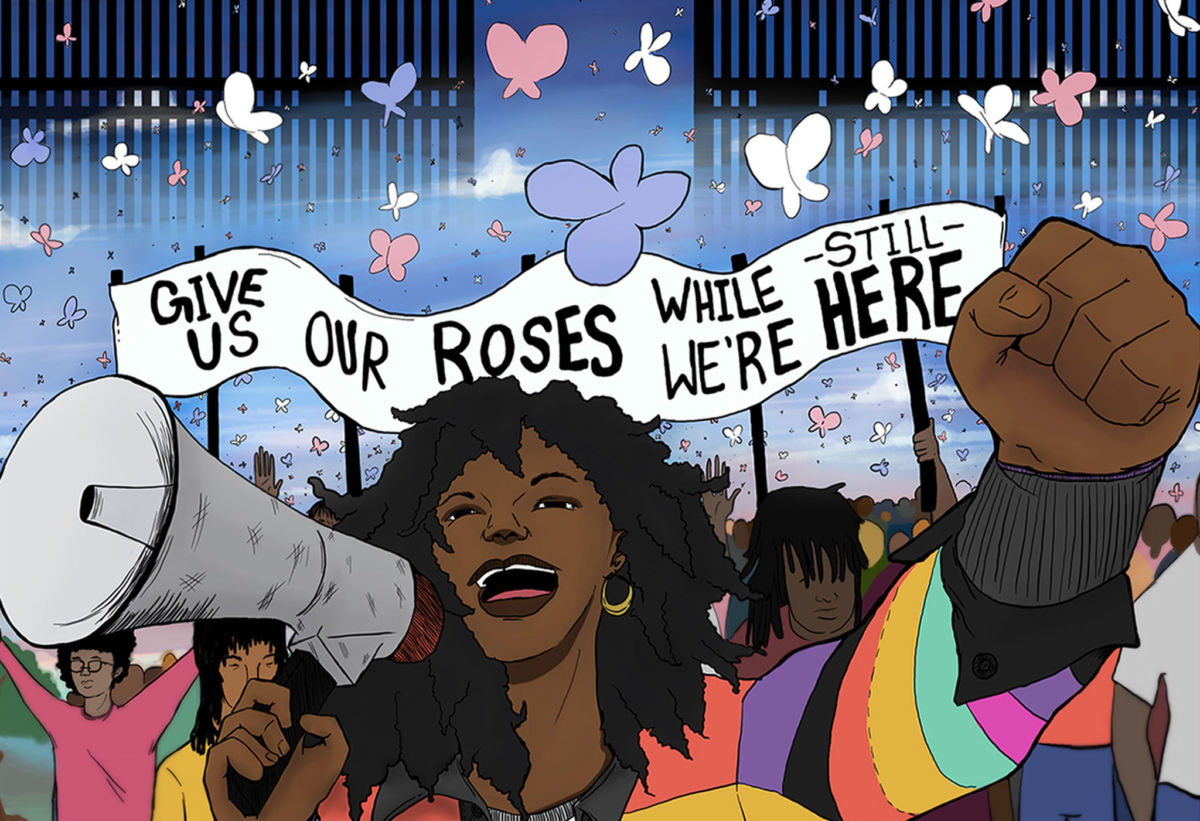Today marks the 21st time that transgender people in the United States, as well as their allies, have gathered for Transgender Day of Remembrance. This annual coming together honors the members of our community who have been lost over the past year to anti-trans violence. Though accurate numbers are difficult to ascertain due to misgendering by local authorities, we know of at least 21 trans people who have been murdered this year. All were either Black or Latinx.
In a better world, Transgender Day of Remembrance would not be necessary. In that world, 17-year-old Bailey Reeves, the youngest victim this year, would not have been shot to death several times in her torso. Nor would Bee Love Slater have been burned alive in her car beyond recognition. And, of course, an unnamed trans woman in Florida would not have been beaten, tied to a minivan and dragged to within an inch of her life. Somehow, she miraculously survived.
Normally, commemorations like Trans Day of Remembrance are ways that we record in our collective consciousness brutal episodes which have passed but are no longer. However, the grim reality for those of us who are trans, estimated to be 1 percent of the U.S. population, is that the specter of violence is all too present.
In fact, the U.S. has the highest level of recorded killings of trans people on the planet except for two countries: Brazil and Mexico. The situation for trans life and death is so acute that the American Medical Association this year declared anti-trans violence to be an epidemic.
The reality that nearly all those who were murdered are African American underscores that violence happens at the intersections of so many other issues. Black trans women face extreme levels of unemployment, as well as housing, education and health care distress. Black trans women are dying because so many other things are failing.
This devastating violence against trans women is occurring in the context of a dramatic increase in recorded “hate crimes” since 2015. According to the FBI, 2015-2017 saw attacks classified as hate crimes rise to some of the highest levels on record. And 2018 saw the number of murders classified as hate crimes reach highs not seen for nearly three decades.
The spasm in killings motivated by hate is taking place against the backdrop of policy violence perpetrated by an administration that is arguably the most anti-LGBT+ since that of Ronald Reagan’s in the 1980s. Despite the fact that as a presidential candidate, Donald Trump uttered positive words about the LGBTQ community at the 2016 GOP convention, he telegraphed his true intent with the selection of then-Indiana Gov. Mike Pence, who has worked tirelessly to marginalize LGBT+ people for decades.
Since ascending to the highest offices in the land, Trump and Pence have targeted trans people with gusto, making trans people their centerpiece in a federally inspired transgender backlash.
The current administration is forcibly removing trans people from the military and refusing to guarantee equal access for transgender kids in schools across the country. It is also fighting for the right to deny trans patients equal access to health care and — most dangerously — is arguing before the Supreme Court that transgender people should be stricken from the 1964 Civil Rights Act. As a whole, these actions translate into violence against trans people on a mass scale.
The toxic mix here is that both the physical and policy violence work together to form an ecosystem of antipathy against trans people. Not only does the policy violence create a culture of permissiveness for individual acts of violence, but they both have the same aim: to erase and deny the fundamental humanity of transgender individuals.
That is why we need the Equality Act to ultimately become law. The Equality Act would explicitly ban discrimination against LGBTQ people in the areas of employment, housing, education and public services. It would also amend the Civil Rights Act of 1964 to explicitly ban discrimination in public accommodations.
While this pivotal piece of legislation languishes in the Republican-controlled Senate and faces a hostile White House, we need the Supreme Court to rule affirmatively in the current case before it on whether the minimal protections of Title VII of the Civil Rights Act apply to trans people. Correspondingly, beyond these legal actions, trans people need massive investments in our housing, economic opportunity, education, health care and restorative justice immediately.
But we will only be able to reach fuller equality when the nearly 9 out of 10 Americans who say they don’t personally know anyone who is trans actually become invested in our survival. This means that allyship must move from a social media hashtag to actual civic action by millions.
Only then will we be able to reach the point where Trans Day of Remembrance truly becomes an event to mark the forlorn past.
Our most important fundraising appeal of the year
December is the most critical time of year for Truthout, because our nonprofit news is funded almost entirely by individual donations from readers like you. So before you navigate away, we ask that you take just a second to support Truthout with a tax-deductible donation.
This year is a little different. We are up against a far-reaching, wide-scale attack on press freedom coming from the Trump administration. 2025 was a year of frightening censorship, news industry corporate consolidation, and worsening financial conditions for progressive nonprofits across the board.
We can only resist Trump’s agenda by cultivating a strong base of support. The right-wing mediasphere is funded comfortably by billionaire owners and venture capitalist philanthropists. At Truthout, we have you.
We’ve set an ambitious target for our year-end campaign — a goal of $230,000 to keep up our fight against authoritarianism in 2026. Please take a meaningful action in this fight: make a one-time or monthly donation to Truthout before December 31. If you have the means, please dig deep.
